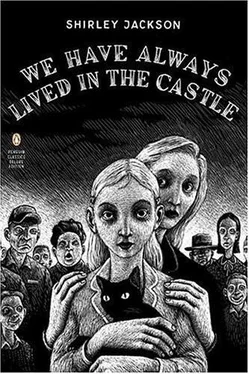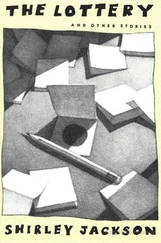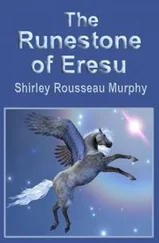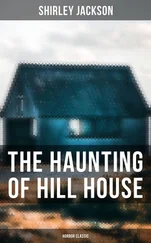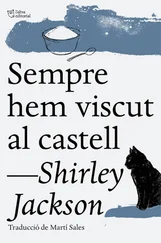Shirley Jackson - We Have Always Lived in the Castle
Здесь есть возможность читать онлайн «Shirley Jackson - We Have Always Lived in the Castle» весь текст электронной книги совершенно бесплатно (целиком полную версию без сокращений). В некоторых случаях можно слушать аудио, скачать через торрент в формате fb2 и присутствует краткое содержание. Город: New York, Год выпуска: 2006, ISBN: 2006, Издательство: Penguin Books, Жанр: Триллер, gothic_novel, на английском языке. Описание произведения, (предисловие) а так же отзывы посетителей доступны на портале библиотеки ЛибКат.
- Название:We Have Always Lived in the Castle
- Автор:
- Издательство:Penguin Books
- Жанр:
- Год:2006
- Город:New York
- ISBN:978-1-101-53065-8
- Рейтинг книги:3 / 5. Голосов: 1
-
Избранное:Добавить в избранное
- Отзывы:
-
Ваша оценка:
- 60
- 1
- 2
- 3
- 4
- 5
We Have Always Lived in the Castle: краткое содержание, описание и аннотация
Предлагаем к чтению аннотацию, описание, краткое содержание или предисловие (зависит от того, что написал сам автор книги «We Have Always Lived in the Castle»). Если вы не нашли необходимую информацию о книге — напишите в комментариях, мы постараемся отыскать её.
is a deliciously unsettling novel about a perverse, isolated, and possibly murderous family and the struggle that ensues when a cousin arrives at their estate.
We Have Always Lived in the Castle — читать онлайн бесплатно полную книгу (весь текст) целиком
Ниже представлен текст книги, разбитый по страницам. Система сохранения места последней прочитанной страницы, позволяет с удобством читать онлайн бесплатно книгу «We Have Always Lived in the Castle», без необходимости каждый раз заново искать на чём Вы остановились. Поставьте закладку, и сможете в любой момент перейти на страницу, на которой закончили чтение.
Интервал:
Закладка:
“I think he was annoyed,” she said. A few minutes later she said, “It will take a great deal of scrubbing to get that hall clean again,” and sighed. I was pleased that she thought of the house and forgot the people outside.
“Jonas?” I said to her; “where is he?”
I could see her smile a little in the darkness of the vines. “He was annoyed, too,” she said. “He went out the back door when I took Uncle Julian in to get his papers.”
We were all right. Uncle Julian might very well forget that there was a fire at all if he became interested in his papers, and Jonas was almost certainly watching from the shadow of the trees. When they had finished putting out Charles’ fire I would take Constance back inside and we could start to clean our house again. Constance was quieter, although more and more cars came down the driveway and the unending patter of feet went back and forth across our doorsill. Except for Jim Donell, who wore a hat proclaiming him “Chief,” it was impossible to identify any one person, any more than it was possible to put a name to any of the faces out in front of our house, looking up and laughing at the fire.
I tried to think clearly. The house was burning; there was fire inside our house, but Jim Donell and the other, anonymous, men in hats and raincoats were curiously able to destroy the fire which was running through the bones of our house. It was Charles’ fire. When I listened particularly for the fire I could hear it, a singing hot noise upstairs, but over and around it, smothering it, were the voices of the men inside and the voices of the people watching outside and the distant sound of cars on the driveway. Next to me Constance was standing quietly, sometimes looking at the men going into the house, but more often covering her eyes with her hands; she was excited, I thought, but not in any danger. Every now and then it was possible to hear one voice raised above the others; Jim Donell shouted some word of instruction, or someone in the crowd called out. “Why not let it burn?” a woman’s voice came loudly, laughing, and “Get the safe out of the study downstairs”; that was Charles, safely in the crowd out front.
“Why not let it burn?” the woman called insistently, and one of the dark men going in and out of our front door turned and waved and grinned. “We’re the firemen,” he called back, “we got to put it out.”
“Let it burn,” the woman called.
Smoke was everywhere, thick and ugly. Sometimes when I looked out the faces of the people were clouded with smoke, and it came out the front door in frightening waves. Once there was a crash from inside the house and voices speaking quickly and urgently, and the faces outside turned up happily in the smoke, mouths open. “Get the safe,” Charles called out wildly, “two or three of you men get the safe out of the study; the whole house is going.”
“Let it burn,” the woman called.
I was hungry and I wanted my dinner, and I wondered how long they could make the fire last before they put it out and went away and Constance and I could go back inside. One or two of the village boys had edged onto the porch dangerously close to where we stood, but they only looked inside, not at the porch, and tried to stand on their toes and see past the firemen and the hoses. I was tired and I wished it would all be over. I realized then that the light was lessening, the faces on the lawn less distinct, and a new tone came into the noise; the voices inside were surer, less sharp, almost pleased, and the voices outside were lower, and disappointed.
“It’s going out,” someone said.
“Under control,” another voice added.
“Did a lot of damage, though.” There was laughter. “Sure made a mess of the old place.”
“Should of burned it down years ago.”
“And them in it.”
They mean us, I thought, Constance and me.
“Say—anybody seen them?”
“No such luck. Firemen threw them out.”
“Too bad.”
The light was almost gone. The people outside stood now in shadows, their faces narrowed and dark, with only the headlights of the cars to light them; I saw the flash of a smile, and somewhere else a hand raised to wave, and the voices went on regretfully.
“Just about over.”
“Pretty good fire.”
Jim Donell came through the front door. Everyone knew him because of his size and his hat saying CHIEF. “Say, Jim,” someone called, “why don’t you let it burn?”
He lifted both his hands to make everyone be quiet. “Fire’s all out, folks,” he said.
Very carefully he put up his hands and took off his hat saying CHIEF and while everyone watched he walked slowly down the steps and over to the fire engine and set his hat down on the front seat. Then he bent down, searching thoughtfully, and finally, while everyone watched, he took up a rock. In complete silence he turned slowly and then raised his arm and smashed the rock through one of the great tall windows of our mother’s drawing room. A wall of laughter rose and grew behind him and then, first the boys on the steps and then the other men and at last the women and the smaller children, they moved like a wave at our house.
“Constance,” I said, “Constance,” but she had her hands over her eyes.
The other of the drawing-room windows crashed, this time from inside, and I saw that it had been shattered by the lamp which always stood by Constance’s chair in the drawing room.
Above it all, most horrible, was the laughter. I saw one of the Dresden figurines thrown and break against the porch rail, and the other fell unbroken and rolled along the grass. I heard Constance’s harp go over with a musical cry, and a sound which I knew was a chair being smashed against the wall.
“Listen,” said Charles from somewhere, “will a couple of you guys help me with this safe?”
Then, through the laughter, someone began, “Merricat, said Constance, would you like a cup of tea?” It was rhythmic and insistent. I am on the moon, I thought, please let me be on the moon. Then I heard the sound of dishes smashing and at that minute realized that we stood outside the tall windows of the dining room and they were coming very close.
“Constance,” I said, “we have to run.”
She shook her head, her hands over her face.
“They’ll find us in a minute. Please, Constance dearest; run with me.”
“I can’t,” she said, and from just inside the dining-room window a shout went up: “Merricat, said Constance, would you like to go to sleep?” and I pulled Constance away a second before the window went; I thought a chair had been thrown through it, perhaps the dining-room chair where our father used to sit and Charles used to sit. “Hurry,” I said, no longer able to be quiet in all that noise, and pulling Constance by the hand I ran toward the steps. As we came into the light she threw Uncle Julian’s shawl across her face to hide it.
A little girl ran out of the front door carrying something, and her mother, behind her, caught her by the back of the dress and slapped her hands. “Don’t you put that stuff in your mouth,” the mother screamed, and the little girl dropped a handful of Constance’s spice cookies.
“Merricat, said Constance, would you like a cup of tea?”
“Merricat, said Constance, would you like to go to sleep?”
“Oh, no, said Merricat, you’ll poison me.”
We had to get down the steps and into the woods to be safe; it was not far but the headlights of the cars shone across the lawn. I wondered if Constance would slip and fall, running through the light, but we had to get to the woods and there was no other way. We hesitated near the steps, neither one of us quite daring to go farther, but the windows were broken and inside they were throwing our dishes and our glasses and our silverware and even the pots Constance used in cooking; I wondered if my stool in the corner of the kitchen had been smashed yet. While we stood still for a last minute, a car came up the driveway, and another behind it; they swung to a stop in front of the house, sending more light onto the lawn. “What the holy devil is going on here?” Jim Clarke said, rolling out of the first car, and Helen Clarke, on the other side, opened her mouth and stared. Shouting and pushing, and not seeing us at all, Jim Clarke made his way through our door and into our house, “What the holy goddam devil is going on here?” he kept saying and outside Helen Clarke never saw us, but only stared at our house. “Crazy fools,” Jim Clarke yelled inside, “crazy drunken fools.” Dr. Levy came out of the second car and hurried toward the house. “Has everyone gone crazy in here?” Jim Clarke was saying from inside, and there was a shout of laughter. “Would you like a cup of tea?” someone inside screamed, and they laughed. “Ought to bring it down brick by brick,” someone said inside.
Читать дальшеИнтервал:
Закладка:
Похожие книги на «We Have Always Lived in the Castle»
Представляем Вашему вниманию похожие книги на «We Have Always Lived in the Castle» списком для выбора. Мы отобрали схожую по названию и смыслу литературу в надежде предоставить читателям больше вариантов отыскать новые, интересные, ещё непрочитанные произведения.
Обсуждение, отзывы о книге «We Have Always Lived in the Castle» и просто собственные мнения читателей. Оставьте ваши комментарии, напишите, что Вы думаете о произведении, его смысле или главных героях. Укажите что конкретно понравилось, а что нет, и почему Вы так считаете.
